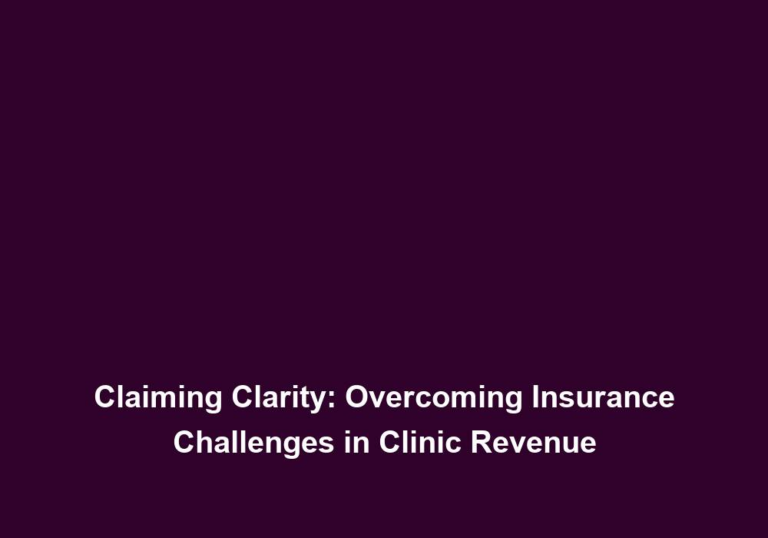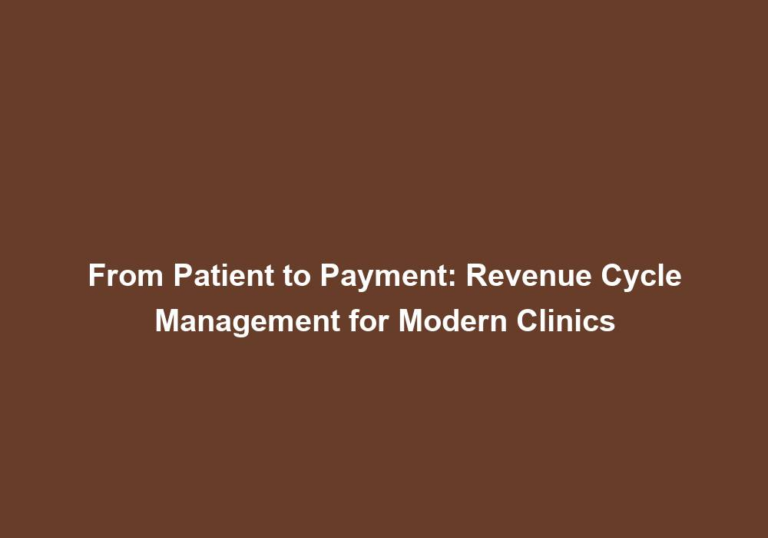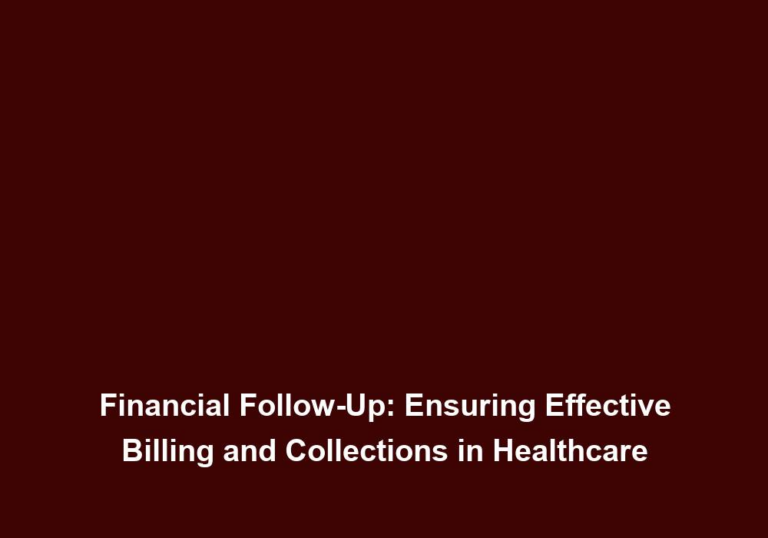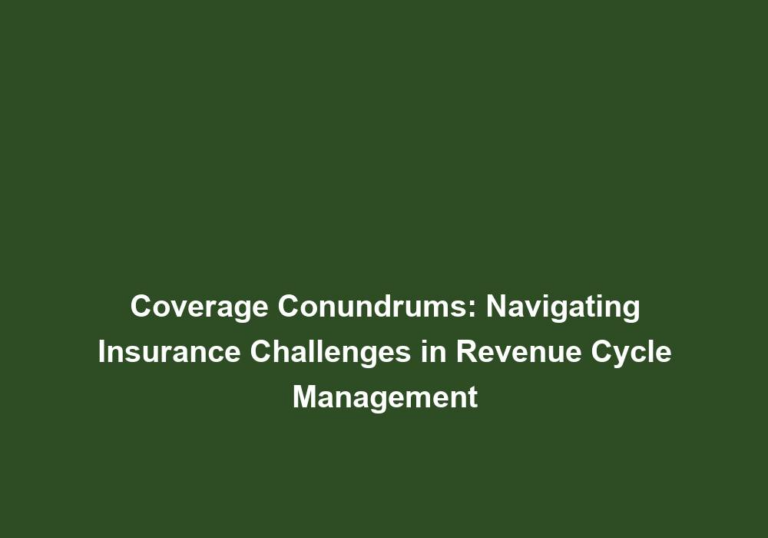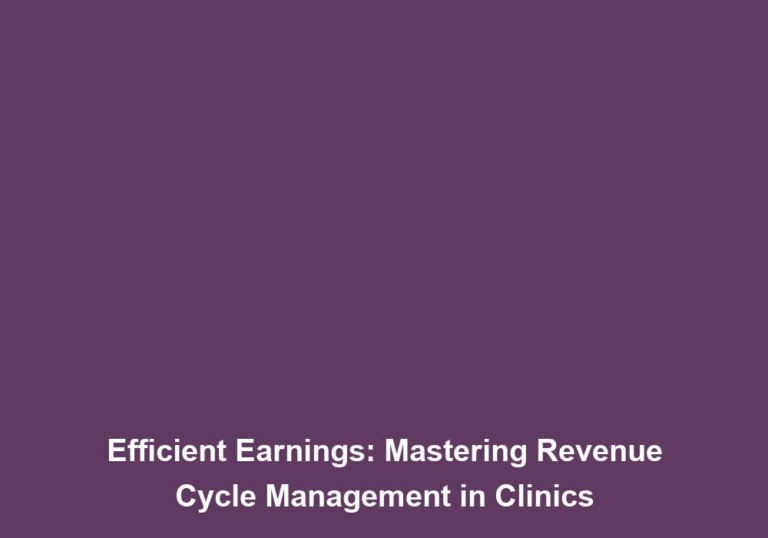Insuring Success: Addressing Healthcare Insurance Challenges in Revenue Management
In the complex landscape of healthcare revenue management, one of the most significant challenges faced by healthcare providers is dealing with healthcare insurance. This intricate system often poses obstacles to effectively managing revenues and can have a substantial impact on the financial well-being of healthcare organizations. In this article, we will explore the various challenges associated with healthcare insurance in revenue management and discuss strategies to overcome them.
The Challenges of Healthcare Insurance in Revenue Management
-
Complex Insurance Policies: Healthcare insurance policies can be complex and difficult to comprehend. The extensive terms and conditions, copayments, deductibles, and coverage limits can confuse both patients and healthcare providers alike. This complexity often leads to errors in billing and claim submissions, resulting in delays in revenue collection.
- Understanding the intricacies of insurance policies is essential for efficient revenue management. It is crucial for healthcare providers to invest time in studying and interpreting insurance policies to ensure accurate billing and claim submissions.
- Creating educational resources, such as user-friendly guides or videos, can help patients better understand their insurance policies, reducing confusion and minimizing billing errors.
- Implementing automated systems that can cross-reference insurance policies with patient information can help identify any discrepancies and prevent billing errors.
-
Claim Denials and Rejections: Insurance companies have strict guidelines and requirements for claim submissions. Even minor errors or missing information can lead to claim denials or rejections. This not only impacts revenue collection but also increases administrative costs as staff need to spend additional time and effort in resubmitting or appealing denied claims.
- Providing comprehensive training to staff involved in claim submissions is crucial to minimize errors. This training should cover detailed claim submission guidelines and common reasons for claim denials.
- Implementing automated claim scrubbing software can help identify errors or missing information before claim submissions, reducing the likelihood of denials or rejections.
- Developing strong relationships with insurance company representatives can help expedite the resolution of claim issues and reduce the time and effort spent on resubmissions or appeals.
-
Inadequate Reimbursements: Insurance companies often negotiate reimbursement rates with healthcare providers, which may not adequately cover the cost of services provided. This situation can create financial strain on healthcare organizations, especially small and independent practices, leading to reduced profitability.
- Conducting regular cost analyses and benchmarking against industry standards can help healthcare providers negotiate fair reimbursement rates with insurance companies.
- Implementing cost-saving measures, such as optimizing resource utilization or streamlining operational processes, can help offset the impact of inadequate reimbursements.
- Exploring alternative revenue streams, such as offering specialized services or partnering with complementary healthcare providers, can help diversify income sources and mitigate the effects of inadequate reimbursements.
-
Rapidly Changing Policies and Regulations: Healthcare insurance policies and regulations are constantly evolving. Staying up-to-date with these changes can be challenging for healthcare providers, who must navigate through a myriad of policy updates, coding changes, and billing guidelines. Failure to comply with these changes can result in claim denials or even legal consequences.
- Establishing a dedicated team or hiring a consultant to monitor and interpret changes in healthcare insurance policies and regulations can help ensure compliance and minimize the risk of claim denials.
- Regularly attending industry conferences or webinars can provide healthcare providers with valuable insights into upcoming policy changes and best practices for compliance.
- Collaborating with professional organizations or industry associations can provide access to resources and networking opportunities to stay informed about changing policies and regulations.
Strategies to Overcome Healthcare Insurance Challenges in Revenue Management
-
Streamline Insurance Verification Process: Implementing efficient insurance verification processes is crucial to ensure accurate patient information, coverage details, and eligibility. This can help minimize claim denials and rejections arising from incorrect or outdated insurance information.
- Utilizing automated verification tools that can access real-time insurance information can streamline the verification process and reduce the risk of errors.
- Implementing standardized protocols and checklists for insurance verification can help ensure consistency and accuracy in collecting and verifying patient insurance information.
- Conducting regular audits of the insurance verification process can identify areas for improvement and ensure compliance with industry standards.
-
Invest in Revenue Cycle Management (RCM) Software: RCM software can automate various revenue management tasks, such as claims processing, coding, and billing. These tools streamline workflows, reduce errors, and ensure compliance with insurance policies, significantly enhancing revenue collection efficiency.
- Choosing a robust RCM software solution that integrates with existing systems and provides comprehensive features can help healthcare providers streamline their revenue management processes.
- RCM software can automate coding processes, ensuring accurate and consistent coding practices, reducing errors, and minimizing the risk of claim denials.
- Utilizing analytics and reporting features within RCM software can provide valuable insights into revenue performance and help identify areas for improvement.
-
Implement Regular Staff Training: To keep pace with evolving insurance policies and regulations, healthcare providers must organize regular training sessions for staff involved in revenue management. These sessions can cover updates in coding guidelines, claim submission requirements, and billing practices, ensuring staff members are equipped with the necessary knowledge and skills.
- Conducting training sessions on a regular basis helps ensure that staff members stay informed about the latest changes in healthcare insurance policies and regulations.
- Offering opportunities for staff members to earn continuing education credits can incentivize participation in training sessions and demonstrate a commitment to professional development.
- Utilizing online training platforms or e-learning modules can provide flexible and accessible training options for staff members with busy schedules.
-
Enhance Documentation and Coding Accuracy: Accurate documentation and coding are critical for successful claim submissions. Implementing standardized documentation templates and providing coding education to healthcare professionals can help minimize errors and improve claim acceptance rates.
- Developing comprehensive documentation guidelines that include clear instructions and examples can help healthcare professionals accurately capture and document patient encounters.
- Providing regular coding workshops or seminars can ensure healthcare professionals are up-to-date with coding guidelines and best practices.
- Implementing a coding audit program can help identify coding errors or discrepancies, allowing for timely correction and improved claim acceptance rates.
-
Establish Effective Communication Channels with Payers: Maintaining open lines of communication with insurance companies can facilitate the resolution of claim issues, such as denials or underpayments. Building strong relationships with payers can help clarify claim submission requirements and negotiate fair reimbursement rates.
- Designating a dedicated point of contact within the healthcare organization to communicate with insurance company representatives can help streamline communication and facilitate prompt resolution of claim issues.
- Regularly reviewing payer contracts and fee schedules can help identify opportunities for negotiation and ensure healthcare providers receive fair reimbursement for services provided.
- Utilizing technology solutions, such as electronic claim submission or online portals, can enhance communication efficiency and provide real-time updates on claim status.
-
Outsource Revenue Management Services: For smaller healthcare organizations struggling with limited resources and expertise, outsourcing revenue management services can be a viable option. Specialized revenue management companies have the necessary expertise and technology to handle complex insurance challenges, improving revenue collection and reducing administrative burdens.
- Conducting thorough research and due diligence when selecting a revenue management service provider is crucial to ensure they have the necessary experience and qualifications to meet the organization’s specific needs.
- Outsourcing revenue management services can free up internal resources, allowing healthcare providers to focus on core clinical operations and patient care.
- Regularly monitoring the performance and effectiveness of the outsourced revenue management services is essential to ensure they meet the organization’s expectations and deliver the desired results.
-
Monitor Key Performance Indicators (KPIs): Tracking and analyzing revenue cycle KPIs, such as average reimbursement time, denial rate, and net collection rate, can provide valuable insights into the effectiveness of revenue management processes. Identifying trends and areas of improvement can guide strategic decision-making and optimize revenue performance.
- Establishing a robust analytics system that can generate reports and dashboards with key revenue cycle KPIs is essential for monitoring performance.
- Regularly reviewing and analyzing KPI data can help identify bottlenecks or inefficiencies in revenue management processes and guide targeted improvement efforts.
- Benchmarking the organization’s performance against industry standards or peers can provide additional context and identify areas where further improvement is needed.
By addressing the challenges associated with healthcare insurance in revenue management and implementing effective strategies, healthcare providers can ensure financial success and maintain a sustainable healthcare system. Proactive measures can significantly enhance revenue collection, reduce administrative burdens, and improve overall profitability. Embracing technology, continuous staff education, and adapting to changing policies are essential steps towards insuring success in revenue management in the ever-evolving healthcare industry.
Note: The content provided above is written in markdown format.


